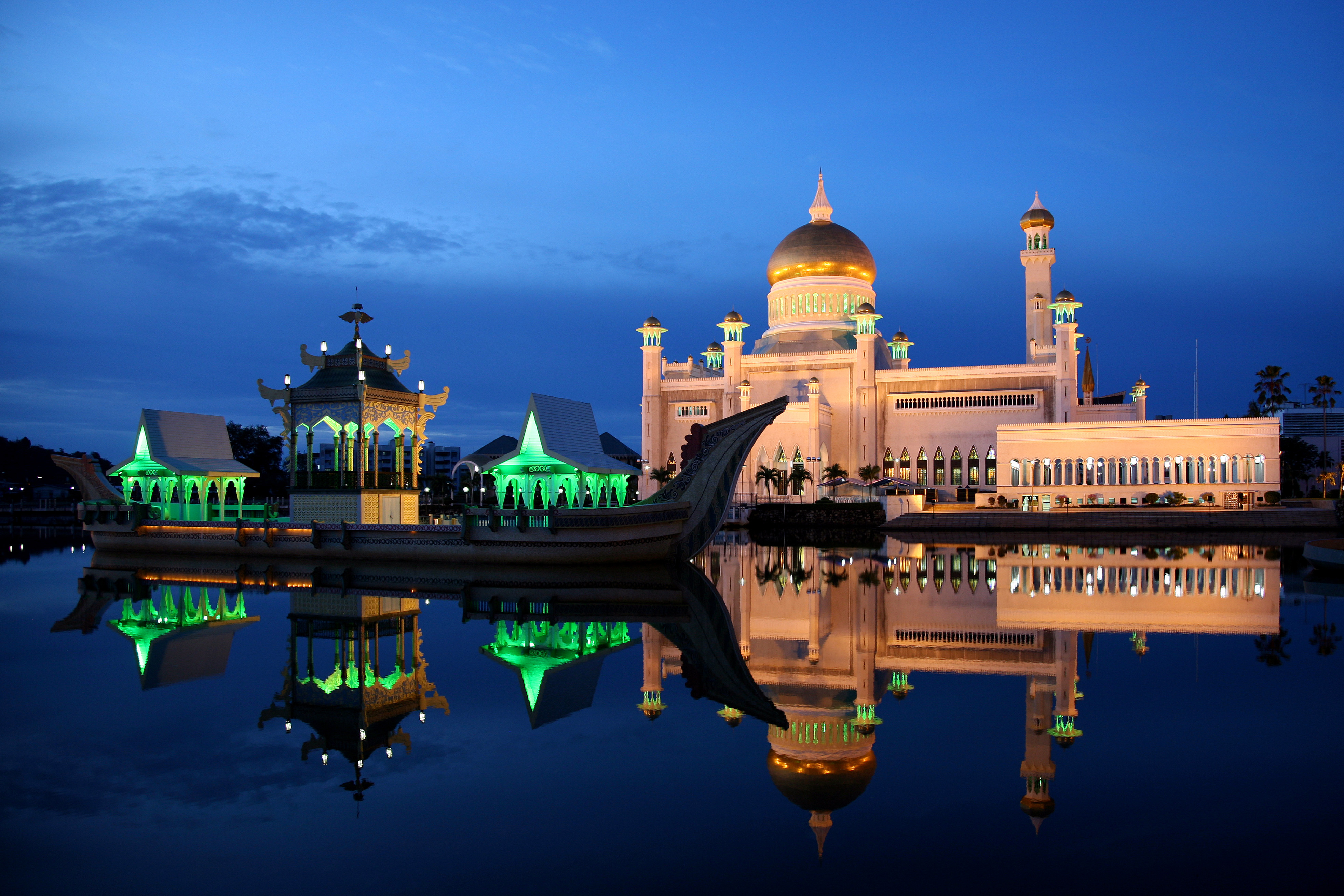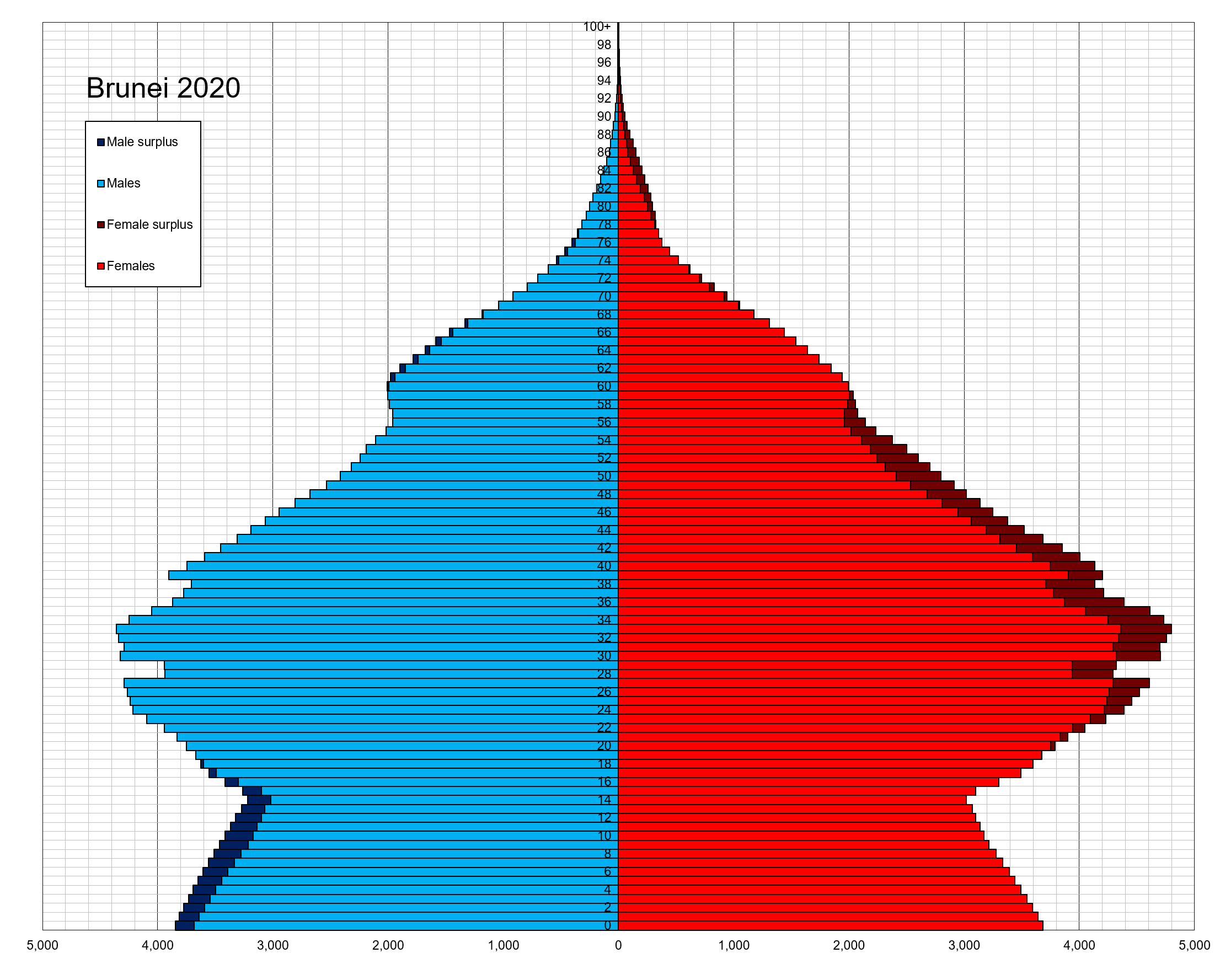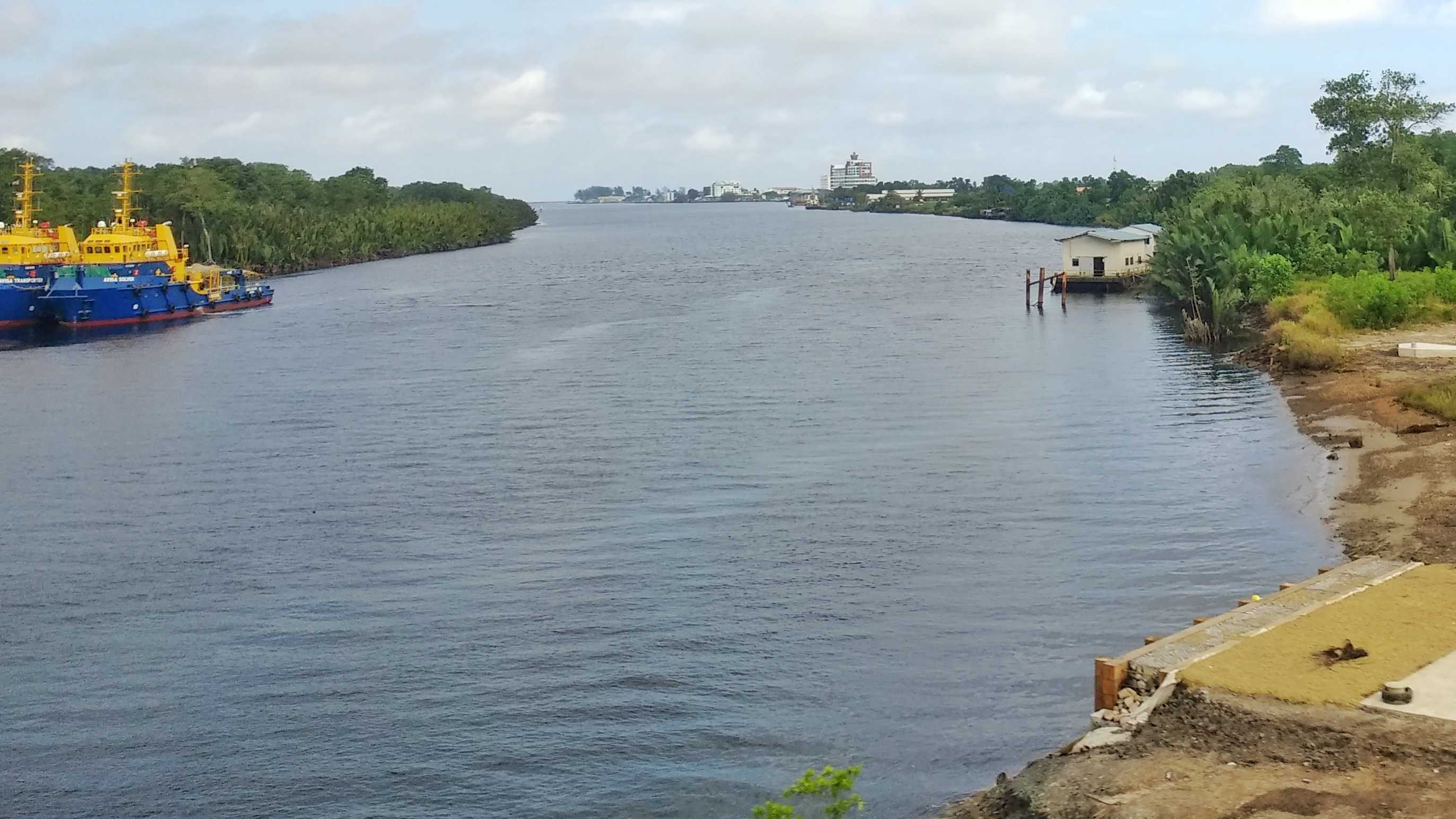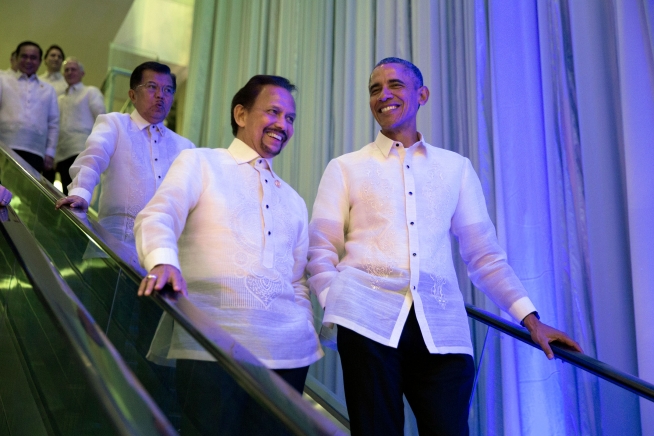|
Islam In Brunei
Islam is Brunei's official religion, 82.70 percent of the population is Muslim, mostly Sunnis of Bruneian Malay people, Malay origin who follow the Shafi, Syafi'e fiqh, school of thought. Most of the other Muslim groups are Malay Kedayans (converts from indigenous tribal groups), local Ethnic Chinese in Brunei, Chinese and Iban people, Dayak Iban converts. History Islam was adopted in the 15th century when a Muslim-Malay was installed as Sultan. The Sultan traditionally was responsible for upholding Islamic traditions, although the responsibility was usually delegated to appointed officials. Since the 1930s Sultans have used rising oil revenues to provide an extensive social welfare system and promote Islam, including subsidising the Hajj, Haji, building mosque, Masjids, and expanding the Department of Religious Affairs (KHEU). With the constitution in 1959, Islam became the official religion of the country. On 30 April 2014, List of Sultans of Brunei, Sultan Hassanal Bolkiah ... [...More Info...] [...Related Items...] OR: [Wikipedia] [Google] [Baidu] |
Sultan Omar Ali Saifuddien Mosque; 2002
Sultan (; ar, سلطان ', ) is a position with several historical meanings. Originally, it was an Arabic abstract noun meaning "strength", "authority", "rulership", derived from the verbal noun ', meaning "authority" or "power". Later, it came to be used as the title of certain rulers who claimed almost full sovereignty (i.e., not having dependence on any higher ruler) without claiming the overall caliphate, or to refer to a powerful governor of a province within the caliphate. The adjectival form of the word is "sultanic", and the state and territories ruled by a sultan, as well as his office, are referred to as a sultanate ( '. The term is distinct from king ( '), despite both referring to a sovereign ruler. The use of "sultan" is restricted to Muslim countries, where the title carries religious significance, contrasting the more secular ''king'', which is used in both Muslim and non-Muslim countries. Brunei and Oman are the only independent countries which retain the ti ... [...More Info...] [...Related Items...] OR: [Wikipedia] [Google] [Baidu] |
List Of Sultans Of Brunei
The sultan of Brunei is the monarchical head of state of Brunei and head of government in his capacity as prime minister of Brunei. Since independence from the British in 1984, only one sultan has reigned, though the royal institution dates back to the 14th century. The sultan of Brunei can be thought of as synonymous with the ruling House of Bolkiah, with generations being traced from the first sultan, temporarily interrupted by the 13th sultan, Abdul Hakkul Mubin, who in turn was deposed by a member of the House of Bolkiah. The sultan's full title is His Majesty The Sultan and Yang Di-Pertuan of Brunei Darussalam. Sultans Uncertainties The earliest historical record of the Sultans of Brunei is not clearly known due to the poor early documentation of Brunei history. In addition there has been an effort to ''Islamise'' the history, with the "official history" not matching up with verifiable foreign sources The ''Batu Tarsilah'' - the genealogical record of the kings of Brun ... [...More Info...] [...Related Items...] OR: [Wikipedia] [Google] [Baidu] |
Malay Islamic Identity
Malayness ( ms, Kemelayuan, Jawi: ) is the state of being Malay or of embodying Malay characteristics. This may include that which binds and distinguishes the Malay people and forms the basis of their unity and identity. People who call themselves Malay are found in many countries in Southeast Asia, united by a notional shared identity but divided by political boundaries, divergent histories, variant dialects and peculiarities of local experience. While the term 'Malay' is widely used and readily understood in the region, it remains open to varying interpretations due to its varied and fluid characteristics. 'Malay' as an identity, or nationality, is considered one of the most challenging and perplexing concepts in the multi-ethnic world of Southeast Asia. Much of the ethos of Malay identity are thought to originate from the ascendancy of Melaka Sultanate in the 15th century. After the fall of Melaka in 1511, the notion of Malayness developed in two ways: to claim lines of kin ... [...More Info...] [...Related Items...] OR: [Wikipedia] [Google] [Baidu] |
Demographics Of Brunei
The demographic features of Brunei include population density, ethnicity, education level, health of the populace, economic status, religious affiliations and other aspects of the population. Like neighbouring countries, Brunei is a Malay-dominated country. Many cultural and linguistic differences make Brunei Malays distinct from the larger Malay populations in nearby Malaysia and Indonesia, even though they are ethnically related and share the Muslim religion. Brunei has a hereditary nobility with the title Pengiran these are, more often than not, related to the Sultan by blood. The Sultan can award to commoners the title Pehin, the equivalent of a life peerage awarded in the United Kingdom. The Sultan also can award his subjects the Dato, the equivalent of a knighthood in the United Kingdom, and Datin, the equivalent of a damehood. Bruneians adhere to the practice of using complete full names with all titles, including the title Haji (for men) or Hajjah (for women) for those w ... [...More Info...] [...Related Items...] OR: [Wikipedia] [Google] [Baidu] |
Murut People
The Murut are an indigenous ethnic group, comprising 29 sub-ethnic groups inhabiting the northern inland regions of Borneo. The Murutic languages are a family of half a dozen closely related Austronesian languages. The Murut can be found mainly in Sabah, Malaysia including in Sarawak, Malaysia, Brunei, and Kalimantan, Indonesia. Etymology The literal translation of ''murut'' is "hill people". Demographics A large percentage of the Murut communities are in the southwest interior of Sabah, East Malaysia, specifically the districts of Keningau, Tenom, Nabawan, and Beaufort along the Sapulut and Padas rivers. They can also be found inhabiting the border areas of Sarawak, (especially around the Lawas and Limbang areas, where they are also referred to as Tagal people), North Kalimantan (traditionally concentrated in Malinau and Nunukan), and Brunei. The Murut population in Brunei is mainly found in the sparsely populated Temburong district, but are actually consisting of Sout ... [...More Info...] [...Related Items...] OR: [Wikipedia] [Google] [Baidu] |
Dusun People
Dusun is the collective name of a tribe or ethnic and linguistic group in the Malaysian state of Sabah of North Borneo. Collectively, they form the largest ethnic group in Sabah. Dusun has been recognised as among the indigenous community of Borneo, with documented heritage by the United Nations Educational, Scientific and Cultural Organization (UNESCO) since 2004. Other similarly named, yet unrelated groups can also be found in Brunei and the Central Kalimantan, Indonesia. Bruneian Dusuns (Sang Jati Dusun) are directly related to the Dusun people of Sabah, both belong to the same Dusunic Family group. Bruneian Dusuns share a common origin, language and identity with the Bisaya people of Brunei, northern Sarawak and southwestern Sabah. In Indonesia, the Barito Dusun groups that can be found throughout the Barito River system belonged to the Ot Danum Dayak people instead. Etymology The Dusuns do not have the word 'Dusun' in their vocabulary. It has been suggested that the t ... [...More Info...] [...Related Items...] OR: [Wikipedia] [Google] [Baidu] |
Temburong District
Temburong District ( ms, Daerah Temburong; Jawi: دائيره تمبوروڠ) or simply Temburong () is the easternmost district in Brunei. It is an exclave — the land is separated from the rest of the country by Malaysia and Brunei Bay, and accessible from the mainland via the Sultan Haji Omar Ali Saifuddien Bridge. It has a total area of . The population was 10,251 in 2016; it is the least populous district in the country. Bangar is the district town and administrative centre. Geography The district is surrounded by Brunei Bay to the north and Sarawak, Malaysia to the east, south and west. The Temburong River flows through the district, and the Sungai Pandaruan river forms the western section of the border with Malaysia. The highest point is Bukit Pagon with the height of . It is also the highest point in the country. Brunei's first national park, the Ulu Temburong National Park, is located south of the Temburong district, covering of the Temburong forest. The na ... [...More Info...] [...Related Items...] OR: [Wikipedia] [Google] [Baidu] |
Tutong District
Tutong District (; Jawi: دائيره توتوڠ) or simply Tutong is one of the four districts of Brunei. It has an area of ; the population was 48,313 in 2016. The administrative town is Pekan Tutong. It is home to Tasek Merimbun, the country's largest natural lake. History Prior to the introduction of the British residential system in Brunei in 1906, Tutong was a land, a type of land ownership in Brunei's traditional government. It was the non-hereditary land of , one of the four traditional (viziers) to the Sultan. Geography The district borders the South China Sea to the north, Brunei-Muara District to the north-east, the Malaysian state of Sarawak to the east and south, and Belait District to the west. With an area of , it is the third largest district in Brunei. The Tutong River is the sole primary river and only flows in the district. It begins in the district's interior in the south and flows northwards which finally discharges into the South China Sea. (" ... [...More Info...] [...Related Items...] OR: [Wikipedia] [Google] [Baidu] |
Belait District
Belait District (; Jawi: دأيره بلأيت), or simply Belait (), is the largest as well as the westernmost district in Brunei. It has an area of and the population of 69,062 as of 2016. The administrative town is Kuala Belait, located at the mouth of the Belait River. The district is commonly associated with the oil and gas industry of the country, mainly concentrated near the town of Seria. Name Belait District is named after the Belait people, the main native inhabitants which traditionally settled near the mouth of the Belait River. Geography The district borders the South China Sea to the north, the Bruneian district of Tutong to the east and the Malaysian state of Sarawak to the south and west. The district covers , which is about half the area of the entire nation. The landscape of the district varies from the peat swamps and lowland forests near the coast to the montane rainforest in the interior parts of the district. The Belait Swamp Forest has been id ... [...More Info...] [...Related Items...] OR: [Wikipedia] [Google] [Baidu] |
Brunei-Muara District
Brunei-Muara District ( ms, Daerah Brunei dan Muara; Jawi: برونائی-موارا ضلع) or simply Brunei-Muara is one of the four districts of Brunei. It has the smallest area among the four districts, with , yet is the most populous, with 289,630 people as of 2016. Bandar Seri Begawan, the country's capital, is located in this district, which is also de facto the district's capital. It is also home to Brunei International Airport, the country's only international airport, as well as Muara Port, the main and only deep-water port in the country. The Brunei River flows within this district and is home to Kampong Ayer, the traditional historic settlement on stilts above the river. Geography The district borders the South China Sea to the north, Brunei Bay to the east, Limbang District in the Malaysian state of Sarawak to the south, and Tutong District to the west. The Brunei River is the sole primary river and only flows in the district. It begins in the south-western pa ... [...More Info...] [...Related Items...] OR: [Wikipedia] [Google] [Baidu] |
Shariah
Sharia (; ar, شريعة, sharīʿa ) is a body of religious law that forms a part of the Islamic tradition. It is derived from the religious precepts of Islam and is based on the sacred scriptures of Islam, particularly the Quran and the Hadith. In Arabic, the term ''sharīʿah'' refers to God's immutable divine law and is contrasted with ''fiqh'', which refers to its human scholarly interpretations. In the historical course, fiqh sects have emerged that reflect the preferences of certain societies and state administrations on behalf of people who are interested in the theoretical (method) and practical application (Ahkam / fatwa) studies of laws and rules, but sharia has never been a valid legal system on its own. It has been used together with " customary (Urf) law" since Omar or the Umayyads. It may also be wrong to think that the Sharia, as a religious argument or belief, is entirely within or related to Allah's commands and prohibitions. Several non-graded crimes are ... [...More Info...] [...Related Items...] OR: [Wikipedia] [Google] [Baidu] |
Hassanal Bolkiah
Hassanal Bolkiah ibni Omar Ali Saifuddien III ( Jawi: ; born 15 July 1946) is the 29th and current Sultan and Yang di-Pertuan of Brunei since 1967 and the Prime Minister of Brunei since independence from the United Kingdom in 1984. He is one of the last absolute monarchs in the world. The eldest son of Sultan Omar Ali Saifuddien III and ''Raja Isteri'' (Queen) Pengiran Anak Damit, he succeeded to the throne as the sultan of Brunei following the abdication of his father on 5 October 1967. The sultan has been ranked among the wealthiest individuals in the world. In 2008, ''Forbes'' estimated the sultan's total peak net worth at US$20 billion. Following the death of Queen Elizabeth II of the United Kingdom in 2022, the Sultan is currently the world's longest-reigning current monarch, as well as the longest-serving current head of state. On 5 October 2017, the sultan celebrated his Golden Jubilee to mark the 50th year of his reign on the throne. Early life The sultan was bor ... [...More Info...] [...Related Items...] OR: [Wikipedia] [Google] [Baidu] |








